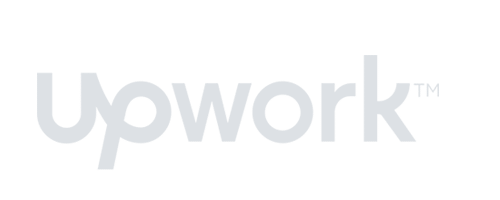Mobile-driven activities have become more popular among individuals and companies. This tendency is developing at a greater rate in upcoming years as an inevitable result of increased business mobility. This undoubtedly arouses the long for customized mobile apps, whether they serve any purpose. So what is mobile app development? The article will revolve around this main topic and give you a deep insight into this tech subsegment.
What is Mobile App Development?
Mobile app development includes all practices and processes of designing and building an app that runs on different mobile platforms (e.g. iOS or Android).
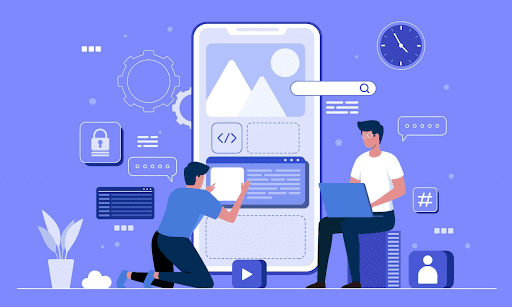
This job, however, covers much more essential activities than it. Whether your company uses in-house staffing or external teams to make a mobile app. The main responsibilities often range from identifying existing problems and coming up with feasible ideas to even marketing and upgrading a deliverable after launch.
As a sub-sector of software development, mobile app development also ponders such important features as hardware specs or screen sizes. To guarantee its compatibility with assorted devices. Also, core and advanced functionality can vary as per your company’s industry (e.g. healthcare, hospitality or banking). Types of apps (i.e. hybrid, native or progressive web) and usage purposes.
What are the Different Types of Technologies in Mobile App Development?
Once you answer the question “What is mobile app development?”, your company will determine special tools used in each stage of the mobile app development process. Accordingly, we’ll divide these technologies into five major categories as follows:
1. Front-end Development Tools
Elements displayed in the user interface are outcomes of front-end development. To build an attractive outlook for your app. To increase user experience (UX), both front-end developers and UX/UI designers need such notable programming languages, frameworks, and libraries as JavaScript, HTML5, CSS3, Objective-C, or Swift. These technologies and tools can vary across project requirements, operating systems, and app types.
Additionally, the availability of app builders now eases front-end developers’ work by accompanying already-built features and drag-and-drop systems. Some typical development platforms entail Appery, Zoho Creator, and Appy Pie.
2. Back-end Development Tools
Any requests or data provided by clients on the front-end side will be processed. In the server, customers cannot directly see. Building a long array of reusable features that are centrally monitored behind the screen. Among the main responsibilities of back-end developers.
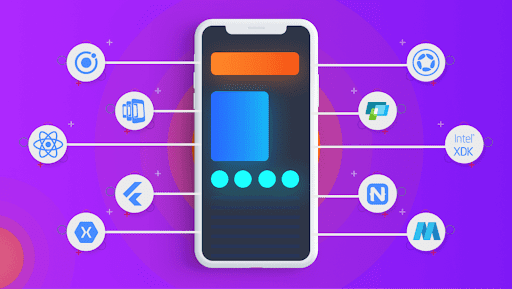
Given back-end technologies, you may think of:
- Coding languages: Kotlin, Swift, Python or Ruby;
- Frameworks and libraries: Swiftic, React Native, Node.js, and more;
- Cloud platforms: including infrastructure as a service (IaaS) and platform as a service (PaaS) such as Google App Engine or Microsoft’s Azure;
- Database servers: typically IBM Informix or Microsoft SQL Server which facilitates the computer approach to databases;
- Mobile application servers: functioning as a bridge between the back-end server and the client terminal.
Moreover, your company can make the backend development easier by using backend services namely Back4App, Firebase, or Parse. These platforms offer pre-built functionality in terms of database, security.
3. Testing Tools
To guarantee your mobile app is free from bugs and defects, testing before introducing the app to the public is a must. Mobile app testing can be manually or automatically implemented.
In the market now, there is a myriad of free and paid automation tools to test the app performance, typically TestComplete, Kobiton, Avo Assure, and Katalon Studio.
4. Project Management Tools
The mobile app development procedure involves the development team, project manager, and your company’s representative. To ensure work wraps up by the deadline and eliminates unexpected misunderstandings, project management software is needed during the process. Accordingly, staff may easily follow their assigned tasks and completion status whereas your company can give feedback in no time.
What are the Benefits of Developing Your Own App?
When your target customers shift their activities to a virtual world, tailoring your mobile app proves necessary to promptly satisfy their online demands. In turn, your company itself accordingly receives accompanying benefits as follows:
- Position your brand better: Like other corporate identity factors (e.g. logo or color), a mobile app also helps engrave your company’s online presence into customers’ minds by providing intuitive design.
- Improve communication with customers: The software improves your company’s relationship with end-users through frequent and speedy interactions which they highly appreciate. Even for out-of-office conversations, the app provides chatbots to automatically answer the common questions of customers. This will become your competitive edge and help accelerate your customers’ trust in the company.
- Enhance efficiency: The introduction of a mobile app undoubtedly enhances worker productivity and ROI. In particular, the software allows staff to collect feedback from customers for later product improvements and produce reports in real-time. What’s more, employees may save a plethora of data in the cloud.
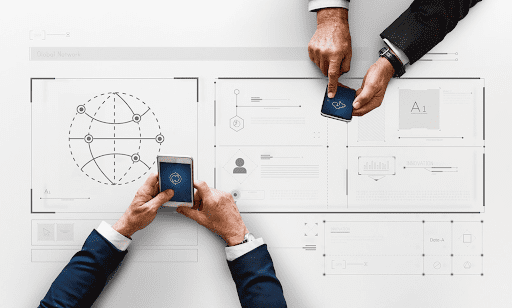
Apart from saving time, features available on mobile apps will help employees have a detailed view of their work performance and accountability. Accordingly, they may suggest viable solutions to enhance the quality of products or services provided.
- Secure your sensitive data: Depending on industry standards and business requirements, the mobile app comes with custom security features like multi-factor authentication or fingerprint scanning. Such functionality possibly protects confidential information from cyberattacks.
What Do You Need to Know Before Building an App?
The worldwide mobile app market is projected to grow by $653.91 over the forecast period of 2021-2025. For this reason, this industry can bring numerous promising prospects for companies of all kinds to approach their potential niche without hassle. However, it’s also equally important to know whether your company should engage in this world and what you should be prepared for if you decide to build your app.
1. Is a Mobile App Essential to Your Company?
A mobile app may come with various merits, but not all companies need to develop one if they find it unnecessary for their long-term growth. Therefore, before investing money and time in customizing an app, you should ask some crucial questions like which opportunities and challenges the software may give you or what the present-day market tendency is.
Moreover, it’s advisable to understand user demands and competitors, which partially helps you decide whether the app may become an advantage over rivals to increase customer loyalty and engagement.
2. Length of Time, Cost and Other Requirements of Building an App
Your company should identify the duration and cost of mobile app development unless you want delays and unexpected costs in launching the app to reduce business performance and competitiveness. Further, other specialized requirements should be added to the idea-building process, to suit your business goals and solve your business’s current issues. Given your business capacity, you should also ponder whether developing an app internally or externally is a better option.
Recommended reading: 10 Stages in App Development Timeline That You Should Know
3. App Feasibility and Usability
No matter which type of mobile app your company aims at, it should be built based on end-user stories. In other words, your potential app should be equipped with intuitive UI design and tailored functionality that delivers business value to customers with ease and emphasizes their demands.

To test the viability of your new idea, you may factor in building a minimum viable app (MVP) first. This software only includes the most important features and helps you learn about your end-user reactions faster.
4. Security Solutions
Information app security is always one of the important issues your company should precede, especially in vulnerable industries like finance or healthcare.
Recommended reading: What Is App Security and How to Make It Right?
5. Continual User Involvement
Apart from app feasibility and usability, other factors should consider getting existing and potential customers involved in the app with enthusiasm.
No player wants their game to be interrupted by disturbing ads nor do shoppers want retail stores to give them no benefits (e.g. higher discount rates or free shipping) for online shopping. Therefore, thinking of how to make your users love to use the app continuously should be prioritized as well.
6. Money Earning From an App
Monetizing a mobile app is what many non-commerce companies do to get funds for operating the software. Game apps may charge fees for in-game items while reading apps may incorporate in-app advertisements that show up between chapters. Depending on which app type your company plans to build, money-making methods may vary but should avoid annoying users.
FURTHER READING: |
1. 75 Mobile App Ideas to Earn Big Money [Updated for 2023] |
2. 24 Web App Ideas that Work for Your Next Project in 2023 |
3. 8 Financial App Ideas That Make Your Business Success |
How Can You Find a Good Developer for Your App?
Besides the in-house workforce, you may allocate much of the development job to several individual freelancers or an outsourcing company. Finding a mobile app developer now isn’t so daunting if you spend time wandering around freelance websites (e.g. Fiver or Toptal) and B2B directories (e.g. Clutch.co or GoodFirms.co) or even making use of your network to seek one.
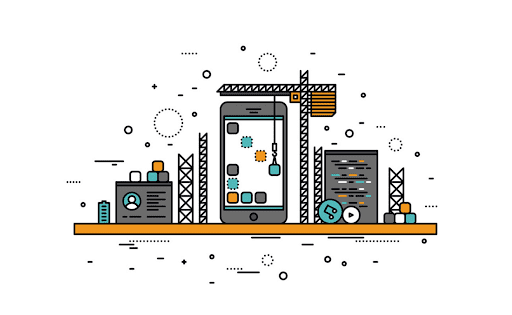
In this section, we’ll list some noticeable tips to help your business find a good developer for your app development project:
1. Clarify business objectives:
Your desired app won’t be successfully developed if you have no specific app idea, target niche, or business needs. Important questions should be asked so that you may envision your potential product, like “What does your company want to achieve from an app?” or “What are your company’s current problems?” and “How does the app help your business to solve these issues?”
2. Do thorough research:
An excellent developer isn’t always compatible with your business. Therefore, it’s more advisable to discover a developer’s areas of specialization, development process, project management, average rates, and legal contracts.
3. Learn about a developer’s experience:
In addition to the given criteria, your company should spend time looking at the developer’s experience. Unbiased reviews and ratings on reliable B2B directories may help you to do so.
FURTHER READING: |
1. 5 Best Education App Development Companies |
2. 6 Best eCommerce App Development Companies |
3. 10 Best Mobile Game Development Companies |
4. The Different Types of App: An In-Depth Guide |
4. Pay attention to communication:
Communication is an important factor throughout the development and app design process. So if a potential developer and your company fail to understand each other at the beginning, nothing ensures the later partnership will go well. Therefore, you should observe how the developer understands your current problem. Or focus on business demands as well as whether the IT vendor uses any tool to boost communication between both parties during the procedure.
How Does It Work?
The mobile app development process can slightly vary across developers. But it often covers several main steps already mentioned in the first section “What is mobile app development?”. Below is a typical example of how a mobile app project at Designveloper from A to Z:
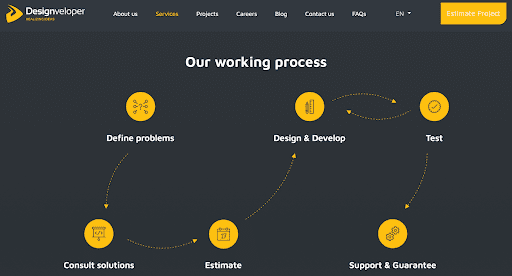
- Define problems: In the first meeting, albeit online or in-person, with clients, the outsourcing company will assist them to identify and analyze existing issues;
- Consult solutions: Afterwards, the company will suggest digital solutions that suit clients’ pre-determined business goals and tech specs;
- Estimate: Once finalizing a solution, those involved will gauge possible costs and time to complete the project;
- Design and development: At this stage, the development team will begin creating UX/UI designs and building back-end servers based on the required metrics. Communication between the parties will proceed to see how the work goes and whether any modifications are made;
- Test: App defects and faults discovered in this stage will be immediately corrected before the finished deliverable is released;
- Support and maintenance: The IT service provider continues supporting clients through maintenance and upgrade services to make essential changes based on end-user feedback.
Conclusion
Mobile app development has a more prospective future as a result of increased mobility. In the article What is Mobile App Development: Everything You Need to Know, we hope you will have better knowledge of this sector to make a sensible decision in building an app.







